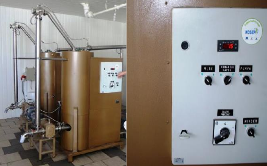Improved sanitation conditions and energy efficiency in cream production

Investor
A margarine producer

Location
Prizren, Kosovo

Investment
A new cream production machine

Investment Size
€40,000

Financial results
Payback period of 5.4 years; annual cost savings of €7,500

Energy savings
55%

Water savings
30%

CO2 savings
18 tonnes of CO2 per year

This producer of cream, margarine, jam and fifty other food products in Prizren, Kosovo consumes electricity in its production process. If there is an electricity supply shortage, the company switches to a diesel generator.
To reduce energy consumption and improve production efficiency, the company decided to invest in new equipment.
The company addressed KoSEP for a financing and advisory package for this investment. The KoSEP team supported the company with analysis of the proposed technologies, in particular, the potential for energy savings and the financial-technical parameters of the project.
The project consisted of installation of a new efficient cream production machine.
The €40,000 investment allowed the company to reduce its electricity and diesel consumption by 67 per cent, maintenance costs by 50 per cent, water consumption by 30 per cent and expand its business. These savings amount to €7,500 per year, which allows the company to repay the investment in just five and a half years. The future cash-flows will become company income for years to follow. In addition, the new equipment improved the sanitation conditions of food processing and the quality of the product.
This project demonstrates that investments in energy efficiency are usually coupled with other benefits, such as process optimisation, a production capacity increase, product quality improvements and reduction of other costs. Therefore, it is worth checking the energy saving potential of all such investment measures, in order to check if they can bring additional income from the reduced energy consumption.
The EBRD, through KoSEP, supports the sustainable financing and implementation of energy efficiency and renewable energy projects by the private sector. Together, the private, residential and public sectors can make a change in energy consumption patterns and contribute to environmental protection.



